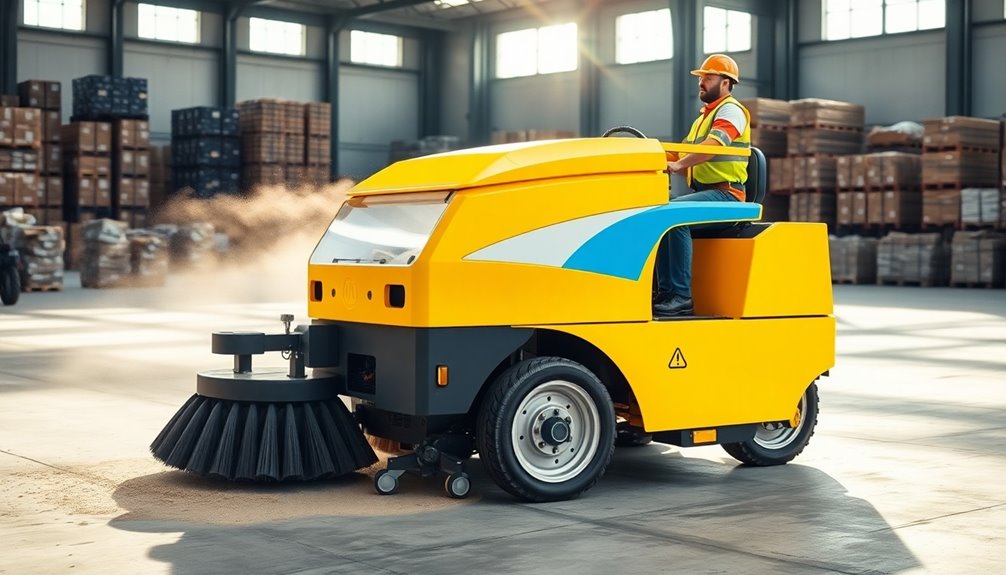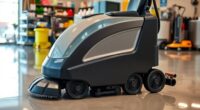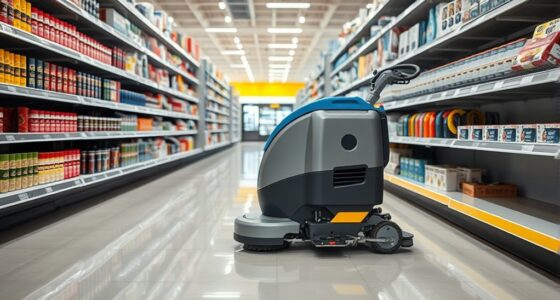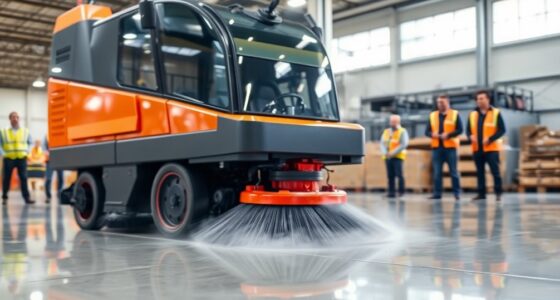To maximize productivity with industrial sweeper machines, you should first understand the machine's features and limitations. Regular maintenance is essential—clean the machine and inspect components frequently. Choose the right cleaning solutions to tackle various debris types effectively. Organize your cleaning tasks and schedule efficiently to boost output. Finally, train operators thoroughly on best practices and safety protocols. Stick around to uncover more tips and strategies to enhance your overall cleaning efficiency.
Key Takeaways
- Familiarize yourself with the machine's controls and settings to enhance operational efficiency and effectiveness during cleaning tasks.
- Create a detailed cleaning schedule to ensure consistent maintenance of areas and optimize resource allocation.
- Select appropriate cleaning solutions and follow dilution guidelines to maximize dirt removal without damaging sensitive components.
- Conduct regular maintenance, including inspections and lubrication, to extend the machine's lifespan and reduce unexpected downtime.
- Provide thorough training for operators on safety protocols and machine functionalities to improve performance and ensure safe operation.
Understand the Machine

Understanding your industrial sweeper machine is vital for effective operation. Start by thoroughly reading the user manual to grasp the machine's functionalities and features.
Attend training sessions whenever possible to enhance your skills and guarantee safe operation. Familiarize yourself with the controls and settings; this knowledge can greatly boost efficiency during your cleaning tasks.
It's also important to understand the machine's limitations to prevent misuse and avoid damaging the equipment, ultimately extending its lifespan.
Regularly review the operational guidelines to stay updated on best practices and any changes in recommended procedures. By doing so, you'll not only maximize your productivity but also make sure you're using the sweeper machine to its full potential.
Conduct Regular Maintenance
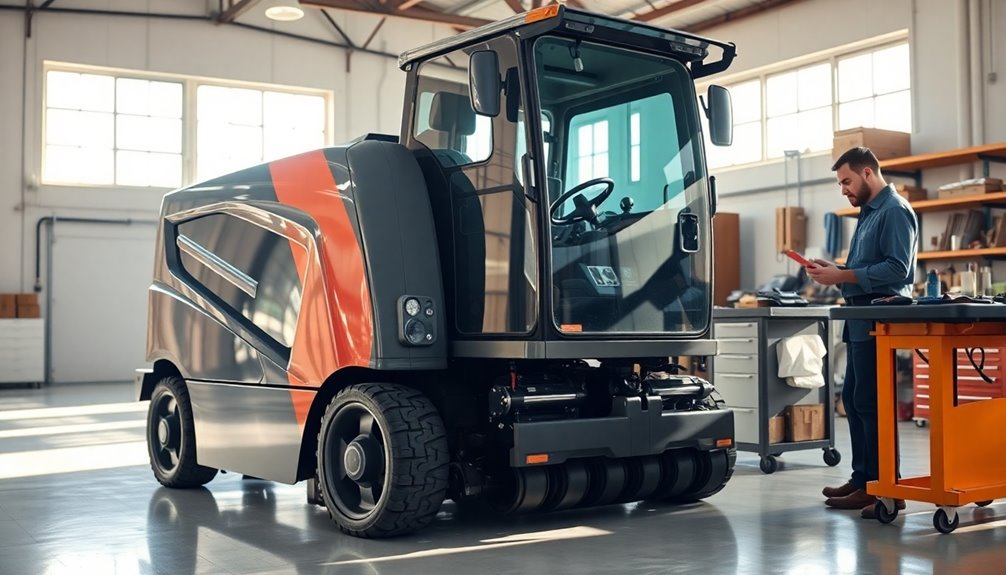
To keep your industrial sweeper machine running smoothly, regular maintenance is essential. Following the manufacturer's guidelines can extend its lifespan by up to 30% and guarantee consistent performance.
After each use, clean the machine thoroughly, especially the debris containers and filters, to maintain maximum suction and cleaning efficiency. Conduct routine inspections to check for wear and tear on belts, brushes, and electrical components, helping you avoid costly repairs.
Lubricate moving parts as recommended to reduce friction, which improves energy efficiency and lowers operational costs. Finally, replace worn or damaged components promptly to operate at peak performance, minimizing downtime and enhancing overall productivity.
Prioritizing these maintenance steps will keep your cleaning machines in top shape.
Optimise Cleaning Solutions

When you choose the right cleaning solutions for your industrial sweeper machine, you boost its effectiveness and protect its components. Always follow the manufacturer's instructions for peak performance. Dilute cleaning solutions properly to enhance efficiency and achieve maximum dirt removal with fewer passes. The right cleaning agents maintain the longevity of sensitive components, minimizing repair costs. Regularly assess your cleaning solutions based on the debris type for improved cleaning effectiveness.
| Cleaning Solution | Purpose | Manufacturer Recommendation |
|---|---|---|
| Degreaser | Heavy grease removal | Follow dilution guidelines |
| Neutral pH Cleaner | General cleaning | Check compatibility |
| Disinfectant | Hygiene maintenance | Use as directed |
| Specialty Cleaner | Specific stains removal | Consult manufacturer |
Plan and Organise
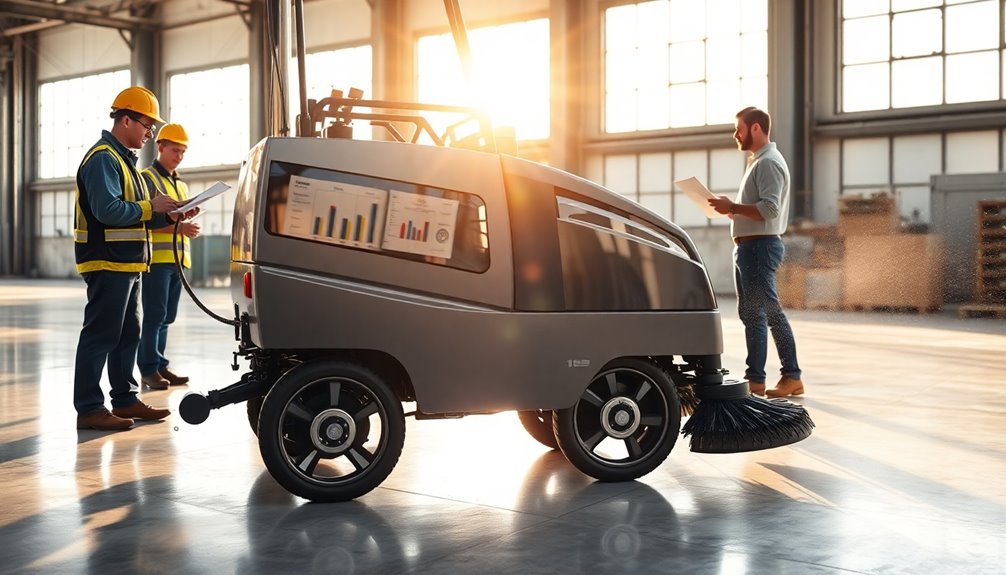
Effective planning and organization are essential for maximizing the efficiency of your industrial sweeper machine.
Start by creating a detailed cleaning schedule that outlines specific areas and their cleaning frequency, ensuring thorough coverage. Organize cleaning tasks by grouping similar areas together to enhance productivity and reduce travel time.
Allocate resources wisely by assigning personnel familiar with the areas and equipment, which boosts overall effectiveness. Always consider safety risks; plan cleaning operations during off-peak hours to minimize accidents.
Use a checklist to monitor completed tasks, allowing you to adjust future cleaning schedules based on effectiveness.
This strategy not only helps you maximize efficiency but also maintains cleanliness standards, ultimately enhancing productivity across your operations.
Train and Educate Operators

Maximizing the efficiency of your industrial sweeper machine also relies heavily on the skills and knowledge of its operators. Thorough training is essential; make certain operators understand all controls, settings, and functions for effective machine handling.
Educate them on safety protocols, including personal protective equipment (PPE) and potential hazards associated with operating these machines. Also, guide operators in adjusting settings based on different surface types to achieve ideal cleaning results.
Regular performance assessments help identify areas for improvement and reinforce best practices.
Don't forget the importance of ongoing training—refresher courses and workshops keep operators updated on new technologies and techniques, boosting their efficiency and productivity in the long run.
Frequently Asked Questions
What Are Common Mistakes to Avoid When Using Industrial Sweepers?
When using industrial sweepers, there are a few common mistakes you should avoid.
First, don't overlook regular maintenance; neglecting this can lead to poor performance.
Also, avoid using the wrong settings for different surfaces; it can damage both the machine and the area being cleaned.
Finally, don't forget to train your operators properly; without the right skills, efficiency drops.
How Do Weather Conditions Affect Industrial Sweeper Performance?
When it rains cats and dogs, you might think your industrial sweeper's performance will plummet!
But don't fret; while wet conditions can hinder visibility and create slippery surfaces, a well-maintained sweeper still gets the job done.
In contrast, extreme heat can cause dust to cling to surfaces, making it hard to clean effectively.
Can Industrial Sweepers Be Used on Different Surfaces?
Yes, you can use industrial sweepers on various surfaces, including concrete, asphalt, and even some types of gravel.
Each surface may require specific adjustments or settings on the sweeper for peak performance. For instance, on uneven terrains, you might need to modify the sweeper's height or speed.
Always check the manufacturer's guidelines to verify compatibility and avoid damage, allowing you to maintain efficiency and achieve the best cleaning results across different environments.
What Safety Precautions Should Operators Take During Use?
When operating industrial sweepers, you need to prioritize safety.
Wear protective gear, keep your hands clear of moving parts, and guarantee the area's free of obstacles.
Maintain a safe distance from pedestrians, and check for hazards before starting.
Regularly inspect the machine for any wear and tear, and always follow the manufacturer's guidelines.
How Can Operator Fatigue Be Minimized During Long Cleaning Sessions?
To minimize operator fatigue during long cleaning sessions, you should encourage regular breaks to rest and hydrate.
Adjust the machine's settings for maximum comfort, and guarantee that the workspace is well-lit and organized.
Consider using ergonomic seating and controls to reduce strain.
Staying engaged with music or podcasts can also help maintain focus and energy.
Finally, rotating operators can keep everyone refreshed and reduce the risk of burnout.
Conclusion
By understanding your industrial sweeper and keeping it well-maintained, you're setting the stage for success. Optimize your cleaning solutions and plan your tasks to make the most of your time. Don't forget to train and educate your operators; they're the ones who'll drive your productivity forward. When you take these steps, you'll not only keep your workspace clean but also guarantee everything runs like a well-oiled machine, boosting efficiency and saving you time in the long run.
